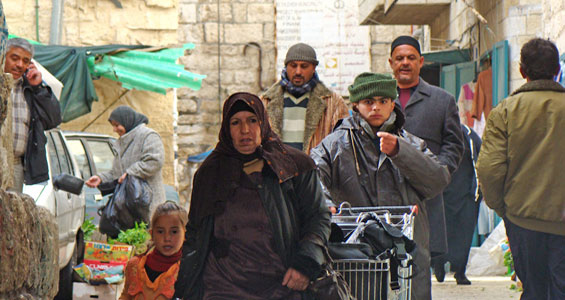Bethlehem struggles ‘out of season’
Western pledges to help fail to tackle the issue of occupation, say Palestinians.

 |
| Residents have seen some improvement last year in Bethlehem’s economy |
Bethlehem, which bustles with tourists around Christmas time, sees little business for the main part of the year.
Ihad and Osama, two young Palestinians who had found work refitting a women’s clothing shop close to the main market, told Al Jazeera that they had been lucky to find the temporary work.
Keep reading
list of 4 items‘We need you’: Solomon Islands’ support for US agency’s return revealed
Why are nations racing to buy weapons?
Parallel economy: How Russia is defying the West’s boycott
Unemployment in Bethlehem is incredibly high – some estimates from last year have put it at over 60 per cent.
“We hope that things will get better,” Victor Batarseh, the mayor of Bethlehem, told Al Jazeera.
“But to tell you frankly, with the results of the Israeli elections, Israeli society is going more to the right … really what we see is that Israeli society is becoming more extremist.”
Western promises
Western powers have made much of their intentions to support Palestinians by building up the West Bank economically.
Over the last year, there has been some limited success here, in one of the West Bank’s most historic towns. But Palestinians say all these efforts fail to tackle the real issue: Israeli occupation.
International donors earmarked $2.8bn for Palestinian development in 2008 and Bethlehem was made the location for an investment conference in May that year.
The conference was trumpeted by its largely western backers as a giant step forward in Palestinian economic development.
Its critics said at the time that the real problem that needed to be addressed was the occupation.
“We haven’t seen any results from that conference,” said Batarseh. “We had hoped there would be something on the ground.”
Separation wall
Bethlehem’s economy is based heavily on pilgrimages and the spending of tourists who are visiting Bethlehem’s famous Christian sites, including the church of the nativity, believed to be built on the site where Jesus Christ was born.
The town saw 1.25 million tourists in 2008, up by 56 per cent from 2007, and 256 per cent from 2006, a success for the town, but its other sources of income have been severely restricted by Israeli occupation.
Agricultural land has been lost, and only a few of the many Palestinians who used to work in Jerusalem are still allowed by Israel to do so.
Since 2000 and the Second Intifada, Israel has reduced the number of Palestinians allowed to work in Israel, saying that it hoped to eventually end all Palestinian employment in Israel.
But Batarseh, the mayor, finds it hard to reconcile Western promises to help people in the West Bank with reality.
“They say they are trying to enhance peace in this region, but unfortunately nothing has been achieved,” he said.
“More land is being taken from its original owners to build settlements and by-roads. More restrictions on the people — sometimes you can’t even go from one village to the other.”
On the side of Bethlehem that faces Jerusalem sits the imposing Israeli built separation wall, while the Israeli settlement of Har Homa, or Jebal Abu Ghneim as it is known in Arabic, gazes blankly out at Bethlehem from iatop a hill across the valley.
‘Some improvement’
The World Bank has made it clear in its reports on the Palestinian territories that Israeli check-points in the West Bank are stifling economic growth.
 |
| Bethlehem depends heavily on the spending of tourists visiting the town’s Christian sites |
A World Bank report released at the close of 2008 noted: “As long as the internal barriers exist and exports and imports are forced to go through a system of back-to back transfer, the Palestinian private sector is unlikely to prosper.”
But the Bank has also noted that developments in the West Bank last year were “better than expected”.
The office of Tony Blair, the former British prime minister who is now envoy to the Middle East for the “Quartet”, told Al Jazeera: “No one underestimates the work that still remains to be done, but the fact is there has been progress in the West Bank, with the economy growing and unemployment falling.
“This is a tribute to the enterprise and ingenuity of the Palestinian people, and to the international community which has devoted considerable resources and expertise to assisting them.”
The Quartet is the Middle East negotiating bloc made up of the EU, UN, US and Russia.
Leila Sansour, the director of Open Bethlehem, an organisation that seeks to promote Bethlehem internationally, agreed that there had been changes.
“Until this last year, tourism was almost non-existent. The last year things changed. There is a lot of pressure from all kinds of parties to ease up things in Bethlehem,” she told Al Jazeera.
But for Palestinians, while economic improvement is welcome, the criticisms levelled at the Bethlehem conference can be applied here too – while it builds confidence, it fails to tackle the real issue.
“We’re very dependent on international aid and Israeli good will,” said Sansour.
“In the end for all of us, for all Palestinians, the issue remains that we don’t have a settlement … While the economy has improved a little bit, we haven’t seen progress on the peace issue, and that will be fundamental.”